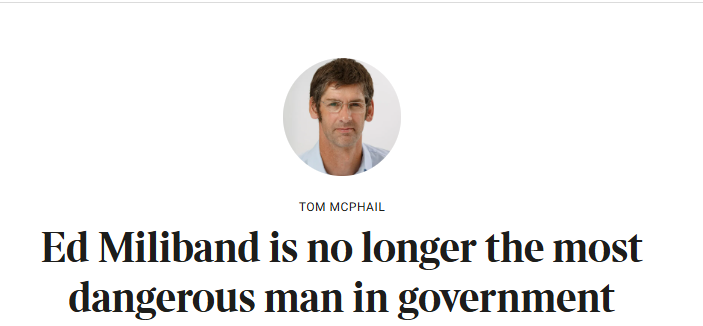Holding two key ministerial posts and pushing substantive reforms, particularly in pensions, the MP for Swansea West is making some on the right nervous.
“Ed Miliband is no longer the most dangerous man in government,” splashed pensions expert Tom McPhail in the Times this week.
It’s an attention-grabbing headline designed to make you click. So, who, exactly, has replaced Miliband as public enemy number one?
Before naming names, the piece opens with a familiar swipe at Miliband, accusing him of pushing up costs and weakening energy security by championing renewables.
Then comes the punchline: Torsten Bell, former Miliband aide, ex-director of the Resolution Foundation, now both pensions and a Treasury minister is the new obsession among right-wing commentators. His elevation to policymaker has clearly ruffled feathers among the wealthy right.
Bell’s past is being repackaged as political ammo. His involvement in Labour’s ill-fated ‘EdStone’ pledge slab during the 2015 election, which was later declared an undeclared election expense, leading to a fine for the Labour party, still haunts him in some circles. The Daily Mail once branded him the ‘twerp’ behind EdStone.
But Bell is no longer just a policy ‘twerp’ or media pundit. Now MP for Swansea West and holding two key ministerial posts, he’s pushing substantive reforms, particularly in pensions, and that’s making some on the right nervous.
One major initiative is the consolidation of the UK’s fragmented private pensions sector, aiming for fewer, stronger, better-run schemes. Even traditionally conservative industry voices have welcomed this move.
Where things get more contentious is his proposal to grant ministers powers to influence how pension funds are invested. Critics, including McPhail writing in the Times, interpret this as a dangerous move that could undermine the independence of pension trustees and pave the way for state-directed investment priorities.
“… he is launching a direct assault on the well-established powers and responsibilities exercised by trustees, who manage their members’ savings for the sole purpose of maximising their retirement income,” McPhail warns.
He goes further, suggesting Bell could become a modern-day King John, poised to raid wealth wherever it’s stored, via inheritance tax reform, changes to capital gains, cuts to pension tax reliefs, and more.
Bell has previously argued against a blanket wealth tax, but his openness to property tax reform or rebalancing tax reliefs is enough to trigger alarm bells among the wealthy and their defenders in the press.
The broader anxiety seems to be that Bell is part of the team shaping Rachel Reeves’ budget. His ideas, once confined to think-tank papers, now have legislative weight. For critics on the right, that makes him not just influential, but dangerous.
Much of the criticism hinges on Bell’s time at the Resolution Foundation. In 2020, he argued that the triple lock, introduced by the Tory/Lib Dem coalition, was an unsustainable mechanism for uprating pensions, favouring wealthier retirees and fuelling long-term fiscal pressure. That position hasn’t changed, as more Resolution Foundation reports have reiterated this view, pointing to the escalating cost of the policy amid volatile inflation and earnings growth.
And right-wing outlets have pounced. GB News recently splashed “State pension future in doubt as triple lock ‘tends to favour better off’ retirees,” stoking fears that Labour might scrap or dilute it, despite pledges from the party to retain it.
But the substance of the criticism deserves attention. In July, the Resolution Foundation warned that triple lock spending could be £15.5 billion higher by 2029-30 than under an earnings-linked system, money the country may not have.
So here we are, a pensions minister who understands the system, wants to modernise it, and has raised legitimate concerns about fiscal sustainability, cast as the new “most dangerous man in government.”
If this is the best smear the right can muster, an intelligent, economically literate minister pushing overdue reforms, then the government might just be on the right track.
Left Foot Forward doesn’t have the backing of big business or billionaires. We rely on the kind and generous support of ordinary people like you.
You can support hard-hitting journalism that holds the right to account, provides a forum for debate among progressives, and covers the stories the rest of the media ignore. Donate today.




